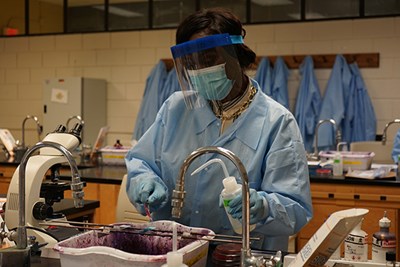Honors Student Wins Conference Award for Finger Sensor Research
 Image by K. Webster
Image by K. Webster
11/16/2020
By Katharine Webster
When he was accepted at UMass Lowell, honors exercise science major Andreas Himariotis was awarded an Immersive Scholarship, which pays for students to do research or study abroad after their first year of college.
He used it for a research position in the Health Assessment Laboratory, working with David Cornell, an assistant professor of physical therapy and kinesiology.
Himariotis joined a team of undergraduates who were just starting to study the accuracy and reliability of a new finger sensor that measures heart rate variability. Heart rate variability yields information about a person’s autonomic nervous system function that can aid in customizing training and exercise prescriptions for individual athletes and fitness enthusiasts. It also provides clues about various cardiovascular diseases and risk factors, Cornell says.
The four students – Thomas Sherriff, Stephanie Amico, Kevin Ha and Himariotis – won a team award at the virtual Student Research and Community Engagement Symposium in the spring. Sherriff and Amico wrapped up their bachelor’s degrees in May, but they stayed with the project as they started on graduate degrees.
This summer, each of the four prepared an abstract and a recorded presentation analyzing part of the data, and then submitted it to the New England Chapter of the American College of Sports Medicine’s annual conference. Himariotis, a junior, won the top undergraduate prize last month, the Student Investigator Undergraduate Award, while Sherriff and Amico were selected as finalists in the doctoral and master’s categories, respectively.
“I don’t know what put me over the top. I wasn’t expecting this,” Himariotis says. “The collaboration was great; I love working with people who have similar interests to me. I was mostly learning from the other students, because they were all older than me.”
 Image by K. Webster
Image by K. Webster
Cornell says he’s proud of the research team, which he assembled in the summer and early fall of 2019. At the time, Himariotis was just starting his sophomore year, Ha was a junior, and Sherriff and Amico were seniors, all majoring in exercise science.
“I taught them how to collect the data, but they got the research participants and they collected, managed and processed the data,” Cornell says.
The students tested the finger sensor in the Health Assessment Lab on multiple people, who were also hooked up to a heart rate monitor and an electrocardiogram (ECG), the gold standard for measuring heart rate variability. Each research subject was measured in two different positions, lying down and sitting up, two days in a row, Sherriff says.
Overall, the students found that the finger sensor, which costs about $150 and comes with a smartphone app that interprets the raw data, was both accurate – yielding almost the same results as the ECG – and reliable – finding similar heart rate patterns in the same person on different days.
While the finger sensor isn’t intended as a diagnostic tool, it can be used by athletes to measure their fitness, performance and recovery, Sherriff explains. And it’s one of a number of low-cost devices that can be used by health care, fitness and other professionals in their everyday work.
“It’s portable, affordable and usable; you just press a button on an app,” he says. “It’s primarily used to measure exercise response and recovery.”
 Image by K. Webster
Image by K. Webster
Sherriff worked on several research projects as an undergraduate. Research into knee pain and gait in runners, bone health in college students and cardiovascular health helped him decide that he wanted to be a physical therapist.
He’s now in the Doctor of Physical Therapy program, and he plans to continue doing research with Cornell, once the laboratory – which was shut down due to the COVID-19 pandemic – reopens. They are currently planning four more studies, including two on the cardiovascular health of firefighters.
“I’ve always wanted to be involved in research, and Dave’s been great to work with,” he says.
Amico says that working in the Health Assessment Lab with Cornell and Sabrina Noel Feldeisen, assistant professor of biomedical and nutritional sciences, inspired her to enroll in the Master of Public Health program, where she plans to focus in dietetics. She says the research experience made her more confident in her clinical skills.
“Learning how to talk to people in that kind of environment is really helpful, and it helped reinforce my undergrad classes,” she says.
 Image by K. Webster
Image by K. Webster
In Ha’s case, the research improved everything from his statistical analysis and citation skills to his comfort in working with people as a clinician.
“Greeting the participant, guiding them through the flow of a study, just my overall interaction with people improved,” he says.
Himariotis looks forward to working with Cornell on more research. Learning how to collect and analyze data, along with preparing an abstract and a taped presentation, are preparing him for his Honors College capstone research and thesis, which he will do with Cornell.
And the entire experience is exposing him to new career possibilities. A three-season varsity athlete in high school, Himariotis hopes to work for a sports team or do research in sports medicine.
“Prof. Cornell talked about what he wanted to do and what he has done previously,” he says. “He used to work with the Milwaukee Brewers as a researcher, and he’s mostly involved with athletes. It’s really interesting to me.”




